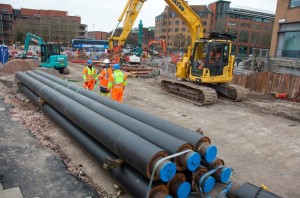Bristol has received £10m in government funding to help the city council expand its pioneering heat networks to more communities – including taking heat from the disused shafts of the city’s former coal mines and its historic Floating Harbour.
The grant – made through the Department for Business, Energy & Industrial Strategy (BEIS) Heat Network Investment Project (HNIP) – will widen the city’s system of underground pipes transporting hot water from different sources to heat homes and businesses. 
The heat network, sometimes referred to as district heating, replaces the need for individual buildings to have their own heating systems by harnessing heat recovered from industry or from renewable sources.
As well as producing fewer carbon emissions, it is more efficient and cost-effective to run and protects against future rises in gas prices.
Heat networks are viewed as a vital element in decarbonising cities. For Bristol, the latest move is a major step on its journey to carbon neutrality and climate resilience by 2030 – a highly ambitious goal 20 years ahead of the UK government’s target date of 2050.
Bristol’s heat network currently supplies more than 1,000 properties across the city with low-carbon heat from a variety of sources is continually expanding to new areas.
The city council last year became the first local authority in the UK to declare a climate emergency – recognising the need to rapidly accelerate progress in both carbon reduction and to create a climate resilient city.
Since then, more than 400 other councils and countless private organisations elsewhere across the UK have declared similar climate emergencies.
Part of this network expansion will include the creation of a large water-source heat pump which will produce zero-carbon heat sourced from the city’s historic Floating Harbour while another section will use waste heat from the University of Bristol’s new campus development.
This project will be the first of its kind for the council and will result in the largest water-source heat pump in the country.
Feasibility and design will also start on the Bedminster branch of the heat network, initially supplying low-carbon heat to new developments being built in this area of the city as well as existing buildings including Bristol South Pool.
An energy centre is being proposed that will use heat from an adjacent main sewer in addition to potential waste heat from the legacy of the area’s former mining industry, including shafts and tunnels.
Cabinet member for energy and transport Cllr Kye Dudd said: “Our Bristol heat network has such a vital role to play in our city’s journey to carbon neutrality.
“The council has invested over £7m in this infrastructure over the last five years and will continue to expand the network to serve new communities with low-carbon heat.
“This new funding is so welcome to support the growth of the network and will enable us to innovate with new technology that will provide zero carbon heat to a number of new developments in the city.
“It’s also very exciting to see old fossil fuel infrastructure like the Bedminster coal mine being considered for use to provide zero carbon heat for the future – another example of Bristol’s ability to find pioneering ways to tackle the climate emergency.”
The city council’s cabinet has also approved the establishment of a new company governance structure as one of the conditions of the grant.






























